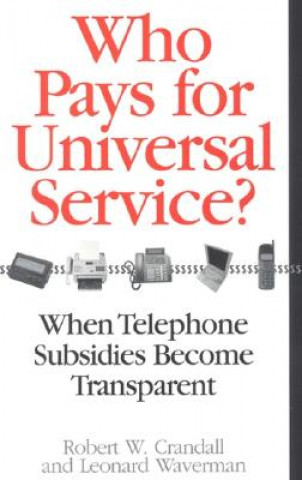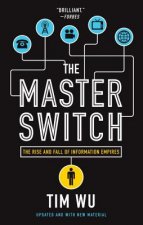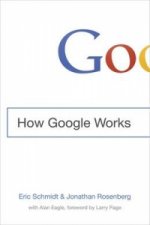
Kód: 04727543
Who Pays for Universal Service?
Autor Robert W. Crandall, Leonard Waverman
In virtually every country, the price of residential access to the telephone network is kept low and cross-subsidized by business services, long distance calling, and various other telephone services. This pricing practice is wide ... celý popis
- Jazyk:
 Angličtina
Angličtina - Väzba: Brožovaná
- Počet strán: 199
Nakladateľ: Brookings Institution, 2000
- Viac informácií o knihe

Mohlo by sa vám tiež páčiť
-

Aesthetics of Sorrow
70.84 €
Darčekový poukaz: Radosť zaručená
- Darujte poukaz v ľubovoľnej hodnote, a my sa postaráme o zvyšok.
- Poukaz sa vzťahuje na všetky produkty v našej ponuke.
- Elektronický poukaz si vytlačíte z e-mailu a môžete ho ihneď darovať.
- Platnosť poukazu je 12 mesiacov od dátumu vystavenia.
Viac informácií o knihe Who Pays for Universal Service?
Nákupom získate 86 bodov
 Anotácia knihy
Anotácia knihy
In virtually every country, the price of residential access to the telephone network is kept low and cross-subsidized by business services, long distance calling, and various other telephone services. This pricing practice is widely defended as necessary to promote "universal service," but Crandall and Waverman show that it has little effect on telephone subscriptions while it has major harmful effects on the value of all telephone service. The higher prices for long distance calls reduce calling, shift the burden of paying for the network to those whose social networks are widely dispersed. Therefore, many poor and rural households--the intended beneficiaries of the pricing strategy--are forced to pay far more for telephone service than they would if prices reflected the cost of service. Despite these burdens, Congress has extended the subsidies to advanced services for schools, libraries, and rural health facilities. Crandall and Waverman show that other regulated utilities are not burdened with similarly inefficient cross-subsidy schemes, yet universality of water, natural gas, and electricity service is achieved. As local telephone service competition develops in the wake of the 1996 Telecommunications Act, the universal-service subsidy system will have to change. Subsidies will have to be paid from taxes on telecom services and paid directly to carriers or subscribers. Crandall and Waverman show that an intrastate tax designed to pay for each state's subsidized subscriptions is far less costly to the economy than an interstate tax. Robert W. Crandall is a senior fellow in Economic Studies at the Brookings Institution. Leonard Waverman is a visiting professor at the London Business School, on leave from the University of Toronto. They are coauthors of Talk Is Cheap: The Promise of Regulatory Reform in North American Telecommunications (Brookings, 1995).
 Parametre knihy
Parametre knihy
Zaradenie knihy Knihy po anglicky Economics, finance, business & management Industry & industrial studies Media, information & communication industries
34.55 €
- Celý názov: Who Pays for Universal Service?
- Podnázov: When Telephone Subsidies Become Transparent
- Autor: Robert W. Crandall, Leonard Waverman
- Jazyk:
 Angličtina
Angličtina - Väzba: Brožovaná
- Počet strán: 199
- EAN: 9780815716112
- ISBN: 0815716117
- ID: 04727543
- Nakladateľ: Brookings Institution
- Hmotnosť: 295 g
- Rozmery: 229 × 152 × 15 mm
- Dátum vydania: 01. June 2000
Obľúbené z iného súdka
-

Mindset
15.44 € -13 % -

Glass Castle
10.76 € -20 % -

Talking As Fast As I Can
10.97 € -26 % -

Sleight of Mouth
24.18 € -22 % -

Reporter
11.37 € -28 % -

Producing Games
41.56 € -18 % -

Virtual Economies
62.40 € -

New New Thing
13.20 € -27 % -

Beyond Belief
22.66 € -13 % -

Steve Jobs
13.31 € -23 % -

Project to Product
19.30 € -28 % -

Hit Refresh
9.95 € -23 % -

Cybersecurity and Cyberwar
11.37 € -28 % -

Taliban Shuffle
14.93 € -22 % -

Fender: The Inside Story
24.59 € -12 % -

Blood, sweat, and pixels
15.44 € -10 % -

Steve Jobs
31.70 € -15 % -

Attention Economy and How Media Works
37.29 € -19 % -

Diary of a Bookseller
10.97 € -26 % -

Glow Kids
15.14 € -29 % -

I'll Be Your Mirror
24.18 € -24 % -

Behind the Cloud - The Untold Story of How Salesforce.com Went from Idea to Billion-Dollar Company-- and Revolutionized an Industry
21.13 € -30 % -

Jony Ive
13.41 € -22 % -

Death of Expertise
13.41 € -28 % -

Back to the Boy
11.37 € -28 % -

Disrupted
11.17 € -25 % -

Prediction Machines
24.69 € -20 % -

Shakespeare and Company
18.59 € -12 % -

Master Switch
15.03 € -22 % -

Disneywar
20.42 € -28 % -

Nobody Leaves
10.26 € -21 % -

Unknown Unknown
2.63 € -20 % -

Attention Merchants
9.85 € -24 % -

Madison Avenue Manslaughter
13.41 € -28 % -

Wizard of Ads
15.54 € -18 % -

English for International Journalists
49.49 € -10 % -

Jadoo
20.73 € -

Blow by Blow
19.30 € -12 % -

Those Guys Have All the Fun
31.30 € -12 % -

Q on Producing
29.47 € -18 % -

Full Marks for Trying
10.66 € -18 % -

Grand Design
52.64 € -

How Google Works
11.27 € -24 % -

Four
10.76 € -25 % -

Infotech Student's Book
62.91 € -

She Said
25.20 € -

Film Encyclopedia
30.99 € -20 % -

In Extremis
11.88 € -27 % -

Alibaba
14.83 € -16 %
Osobný odber Bratislava a 2642 dalších
Copyright ©2008-24 najlacnejsie-knihy.sk Všetky práva vyhradenéSúkromieCookies



 21 miliónov titulov
21 miliónov titulov Vrátenie do mesiaca
Vrátenie do mesiaca 02/210 210 99 (8-15.30h)
02/210 210 99 (8-15.30h)